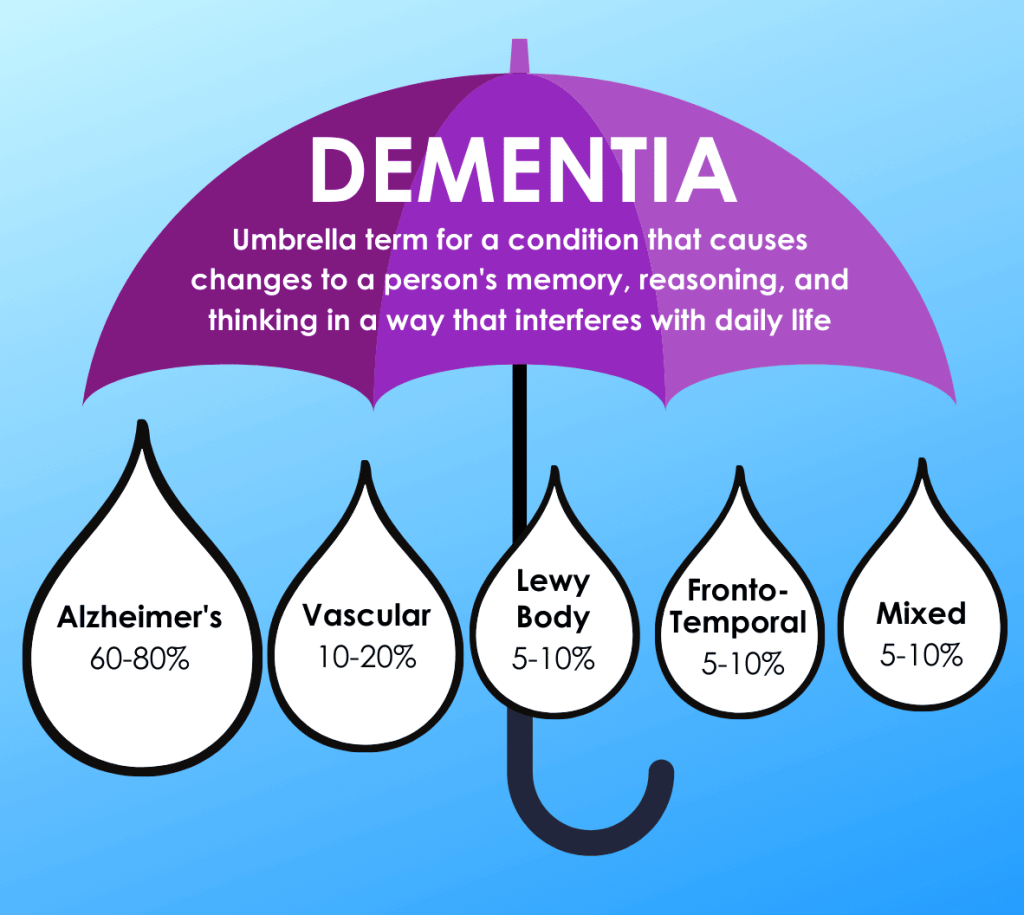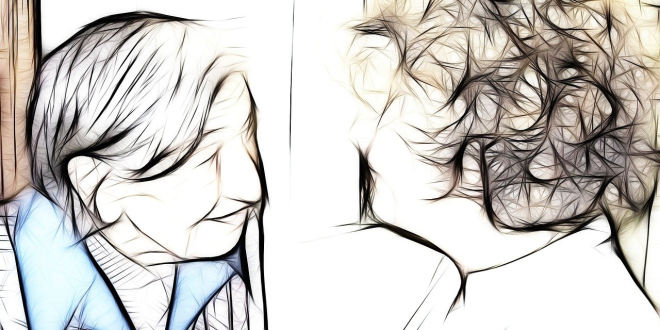Author: Dr. Chirayu Regmi, MD (Internal Medicine), Resident Neurology
A 70 years old professor went missing in Kathmandu 3 months ago. Despite efforts from his family and community members to find him, the search has not stopped. There is still no news on his whereabouts.
The person in question was suffering from a condition called dementia, traditionally described as a gradual loss of memory. The clinical diagnosis of dementia encompasses a much broader spectrum of cognitive impairment. These include a gradual decline in one or more cognitive domains, namely, learning and memory, language, executive function, complex attention, perceptual motor function and social cognition.
Introduction
Dementia is a chronic and progressive condition due to aging of the brain. Alzhemeir’s disease is the most common cause of dementia, which accounts for seven out of ten such cases. The World Health Organization states that more than 55 million people suffer from dementia worldwide. Over 60 per cent of those happen to live in low-and middle-income countries. Prevalence data for Nepal is not available, however, considering there is a 5 per cent prevalence of Dementia among 2.7 million elderly Nepalese, it can be estimated that there are more than 135,000 people suffering from dementia.
Some form of memory loss is a fairly natural outcome of aging. However, memory loss is more severe in dementia and other diagnosed forms of cognitive impairment. Dementia encompasses a wide range of symptoms. While some may only suffer from memory loss, others may lose their ability to reason, have trouble concentrating, or making decisions. They may also hallucinate, feel sad or unreasonably angry.
The global elderly population is steadily increasing, and concurrently, the number of individuals living with dementia is on the rise. While it is a disease that is less physically debilitating, it takes a considerable emotional toll on the patient and their family. In this article, I attempt to describe the common causes, diagnosis, and the potential line of management and prevention of dementia.

Types
Most dementia that arises with age is the result of neurodegenerative disease, an umbrella term to describe gradual decline in function our nervous system with time. Common forms of this condition are Alzheimer’s disease, dementia with Lewy body, frontal temporal dementia and Parkinson’s disease dementia. Moreover, there is also another group of non-neurodegenerative dementia, which may be reversible if the causes are identified timely. The most common cause of this is vascular dementia. There are other less common causes like those related with alcohol, trauma, bleeding or raised pressure in brain. Even some infections like human immunodeficiency virus (HIV) and syphilis, or hormonal disorders like hypothyroidism can present with cognitive impairment.
Strangely enough, people with dementia do not present with a complaint of memory loss. It is often the spouse or family member that raises these concerns to the doctor. They usually complain of having difficulty remembering new information, handling complex tasks that previously would be performed with ease. Further, they talk about symptoms such as appropriate reasoning, and the lack of ability to cope with unexpected events, including getting lost in familiar places.

Alzheimer’s disease
Alzheimer’s disease, a progressive and often life rendering disease, is the most common cause of dementia. It usually occurs in patients older than 65 years of years and its incidence increases with subsequent years. It involves degeneration of parts of the brain that control thought memory and language. The diagnosis is usually performed through clinical testing and further radiological assessments.

Vascular dementia
Vascular dementia is second most common cause of dementia. It is associated with atherosclerotic small vessel disease, which is the narrowing of small arteries by fat and other substances. This happens to be a common culprit among other diseases of the aging population. Patients tend to suffer with difficulty concentrating and executing tasks with general/normal speed. A stepwise progression is a characteristic, and it may be associated with strokes, but occasionally a gradual progression like in Alzheimer’s disease is also reported.
In many cases, when vascular dementia occurs following a stroke, it is often misdiagnosed as post-stroke dementia. However, a more detailed evaluation may reveal signs of stroke like slight weakness of a hand or a leg, difficulty in speaking. Subsequent MRI imaging may however, show evidence of vascular disease.
Lewy body disease
Another common cause of dementia is Lewy body disease. It produces a gradual progressive decline in cognitive ability with other associated symptoms like recurrent visual hallucinations- seeing things that are not actually present in reality. Sleep disturbances and occasional hand tremors like in Parkinson’s disease are common symptoms. But unlike Parkinson disease (where dementia emerges five to eight years after the onset of the movement disorder), in Lewy body dementia, tremors appear simultaneously with and cognitive decline.
Dementia mimics
There may be conditions that present as dementia but are amenable to remedies and are reversible. One such condition is Delirium, which is categorized as a serious change in ones mental ability. It results in confused thinking and lack of awareness of ones surrounding. Though delirium is not considered to be dementia, dementia happens to be a significant risk factor for delirium.
Dementia with depression
Patients with depression more often present with complaints of memory loss than those with actual dementia. Dementia in such patients is termed pseudo-dementia. On clinical evaluation, they may show slowing of mental and physical activities. They are less eager to put effort into testing unlike those with dementia.
Frontotemporal dementia
Frontotemporal dementia is an umbrella term for a group of brain disorders that primarily affect the frontal and temporal lobes of the brain. There damage of the brain cells (neurons) resulting in shrinkage (atrophy) in these areas of the brain that are associated with personality, behaviour and language. The resulting symptoms include unusual behaviours, emotional problems, trouble communicating, difficulty with work, or difficulty with walking. FTD is rare and tends to occur at a younger age than other forms of dementia.
Diagnosis
The diagnosis process of dementia often takes longer durations than a single visit to the clinician. It is often performed over a period of time over several visits. The initial step includes an assessment of ones cognitive function followed by a more complete physical and neurological examination.
Clinicians need to be mindful of assessing the mental health of patients with dementia or with cognitive impairment. Physical examinations are performed to rule out other medical illnesses that may present with dementia. This helps the doctors to carefully filter out signs of strokes, symptoms of Parkinsonism or other abnormalities of gait. Alzheimer’s disease does not have any motor or sensory deficits at presentation. It is important to check serum levels of vitamin B12, screening for infections like neuro-syphilis and HIV, and other lab tests to diagnose possible malignancy and alcoholism. Furthermore, MRI imaging techniques help to identify structural lesions like bleeding, tumours or areas of impaired blood circulation.
Management
The first step is an accurate diagnosis of the type of dementia; this ensures patients are provided with a specialized treatment plan for their unique needs.
Disease specific treatments such as cholinesterase inhibitors, glutamate regulators and newer monoclonal antibodies are available for use in Alzheimer’s disease.
Another important line of treatment is the control of risk factors like high blood pressure and diabetes for vascular dementia. Parkinson’s associated dementia and those with Lewy body need a holistic approach to treat the underlying disease. It also requires evaluation and management of associated neuropsychiatric symptoms, like hallucinations and abnormal behaviour. The use of multiple drugs, especially those that may exacerbate loss of memory like sedatives and hypnotics, should be avoided in elderly patients.
Furthermore, non-pharmacologic and supportive care is equally important. Dementia can cause a decrease sense of smell, which may lead to a loss of appetite and weight. Thus, they are often supplemented with oral nutrition to aid in maintaining a healthy weight.
It is important to consider that those suffering from moderate to severe forms of dementia may pose a considerable risk if they drive. Therefore, this should be carefully evaluated. Falls happen to be another major concern for those with dementia, particularly Parkinson’s syndrome. Pasting signs on the door to reorient the patient, along with alarms to control their movement and regular supervised exercise to prevent restlessness, can reduce the risk of getting lost. The use of GPS tracking devices, along with an identification card including ones address, name, phone number can help patients to redirect them in case they go missing.
Prevention
It is strongly advised to partake in adequate physical activity, leisure activity and social interactions to keep the mind healthy. It is important to keep hypertension and diabetes under control. Similarly, consuming a healthy diet is strongly advised.
In a nutshell, as the aging population increases, the number of people with varying degrees of cognitive impairment is bound to rise significantly in years to come. A better understanding of the disease and possible means for its prevention and treatment, along with community efforts to mitigate the suffering of those affected should guide our principles of comprehensive health care.
Dr. Chirayu Regmi
MD (Internal Medicine), Resident Neurology
UDM-NINAS
About the Author
Dr. Regmi is neurology resident at Upendra Devkota Memorial, National Institute of Neurological and Allied Sciences. He has more than 10 years of clinical experience in treating patients with a variety of illnesses.
 Medicosnext
Medicosnext




